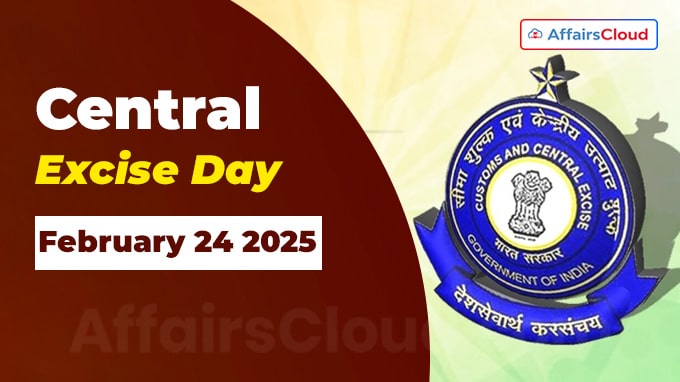 The Central Excise Day is observed annually on 24th February across India to honor the contributions of the Central Board of Indirect Taxes and Customs (CBIC), the authority responsible for managing indirect taxes in India. The day marks the anniversary of the enactment of the Central Excise and Salt Act, 1944, on 24th February, 1944.
The Central Excise Day is observed annually on 24th February across India to honor the contributions of the Central Board of Indirect Taxes and Customs (CBIC), the authority responsible for managing indirect taxes in India. The day marks the anniversary of the enactment of the Central Excise and Salt Act, 1944, on 24th February, 1944.
- It aims to promote the implementation of rules and regulations to ensure the highest standard of excise services.
Objective: The primary objective of this observance is to encourage excise department employees across India to perform their duties efficiently while focusing on curbing corruption in the goods manufacturing industry.
What is Central Excise Duty?
i.Central Excise Duty is an indirect tax levied and collected by the Central Government on goods produced and consumed within India.
- This tax applies to goods that have already been charged with duty, meaning that everyone, regardless of their wealth, indirectly pays the tax when purchasing such goods.
ii.The administration of this tax is authorized under Entry 84 of the Union List in the Seventh Schedule, in conjunction with Article 226 of the Constitution of India.
iii.The collection and regulation of this tax are governed by the Central Excise Act, 1944, along with the relevant Rules framed by the Central Government.
Note: Commodities subject to central excise duties are listed in the Schedule to the Central Excise Tariff Act, 1985 (Act 5 of 1986), which came into force on 2nd February 1986.
Central Excise and Salt Act, 1944:
i.Central Excise and Salt Act, 1944, was the first legislation to impose excise duties on goods and services produced or manufactured within India.
- This Act consolidated 11 previous laws related to excise duty and was introduced new duties on commodities such as coffee, tea, and betel nut.
ii.The act was amended in 1985 and introduced a new act called “Central Excise Tariff Act.”
iii.In 1966, the Act was renamed as the ‘Central Excise Act 1944’. Schedules 1 and 2 of the Act outlined the values and rates of excise duties.
About Central Board of Indirect Taxes and Customs (CBIC):
i.CBIC was established in 1944, as the Central Board of Excise and Customs (CBEC) to consolidate various enactments related to excise duties and customs laws in India.
- CBIC operates under the Department of Revenue (DoR), Ministry of Finance (MoF), GoI, and is responsible for administering indirect taxes, including Central Excise, Service Tax, Narcotics laws and the Goods and Services Tax (GST).
- The Board primarily deals with the Customs Act, 1962, Customs Tariff Act, 1975 and Central Excise Act, 1944.
ii.In 1964, the Central Board of Revenue was split into 2 separate boards: Central Board of Direct Taxes (CBDT) and CBEC, which was later renamed the CBIC in 2018.
iii.The Customs and Central Excise/Central GST Department, MoF was established to manage and enforce customs laws, ensuring the proper collection and regulation of taxes related to these areas.
v.However, after the roll out of the GST from 1 July 2017, the activities of the board are guided by the GST-related Acts.
Chairman- Sanjay Kumar Agarwal
Headquarters– New Delhi, Delhi
Established- 1944




